- Back to Home »
- Performance enhancing drugs
(CNN) -- Here's a look at what you need to know about performance enhancing drugs in sports.
Facts: The use of performance-enhancing drugs by professional athletes, or "doping", has been acknowledged as a problem since at least the 1960s.
The issue has gained prominence in the last ten years as a result of the Bay Area Laboratory Co-Operative (BALCO) investigation, tell-alls by former professional athletes and the Mitchell investigation into drugs in professional baseball.
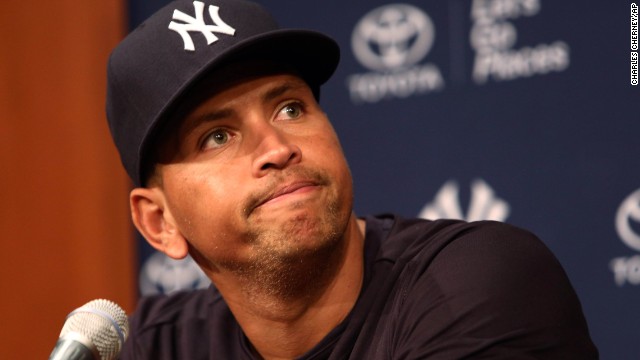 New York Yankees star Alex Rodriguez was suspended in August 2013 after he was accused of having ties to Biogenesis, a now-defunct anti-aging clinic, and taking performance-enhancing drugs. The suspension covers 211 regular-season games through the 2014 season. Rodriguez denied the accusations and said he intends to appeal. Twelve other Major League Baseball players received 50-game suspensions without pay in the Biogenesis probe, and In July, Milwaukee Brewers star outfielder Ryan Braun was suspended for the rest of the season for violating the league's drug policy.
New York Yankees star Alex Rodriguez was suspended in August 2013 after he was accused of having ties to Biogenesis, a now-defunct anti-aging clinic, and taking performance-enhancing drugs. The suspension covers 211 regular-season games through the 2014 season. Rodriguez denied the accusations and said he intends to appeal. Twelve other Major League Baseball players received 50-game suspensions without pay in the Biogenesis probe, and In July, Milwaukee Brewers star outfielder Ryan Braun was suspended for the rest of the season for violating the league's drug policy. 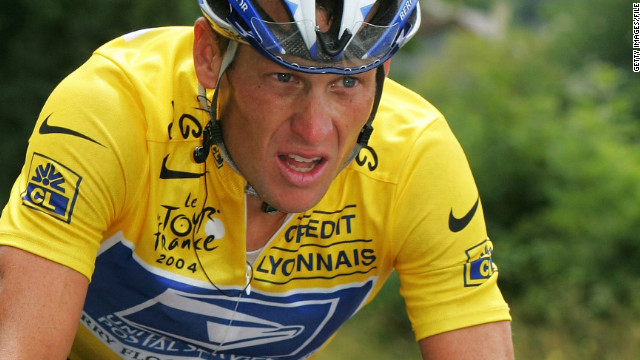 Lance Armstong was stripped of his seven Tour de France titles and banned from professional cycling in October 2012 after being accused of using performance-enhancing drugs. Armstrong confessed in January 2013 to doping during his cycling career.
Lance Armstong was stripped of his seven Tour de France titles and banned from professional cycling in October 2012 after being accused of using performance-enhancing drugs. Armstrong confessed in January 2013 to doping during his cycling career. 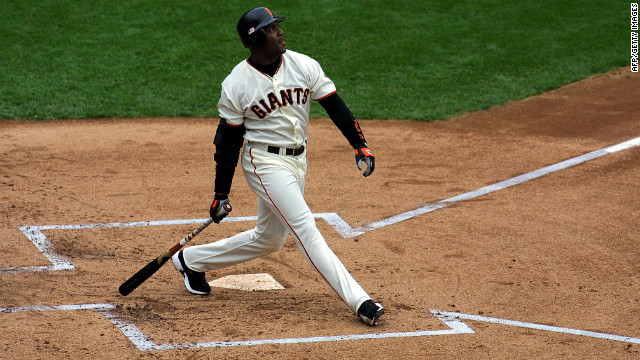 Barry Bonds is baseball's all-time home run leader, but some commentators say there should be an asterisk by his record. Though he's said he never knowingly used steroids, two San Francisco reporters wrote a book alleging he used performance-enhancing drugs. He was indicted on charges of perjury and obstructing justice for allegedly lying to a grand jury investigating steroids, and convicted of obstruction of justice.
Barry Bonds is baseball's all-time home run leader, but some commentators say there should be an asterisk by his record. Though he's said he never knowingly used steroids, two San Francisco reporters wrote a book alleging he used performance-enhancing drugs. He was indicted on charges of perjury and obstructing justice for allegedly lying to a grand jury investigating steroids, and convicted of obstruction of justice. 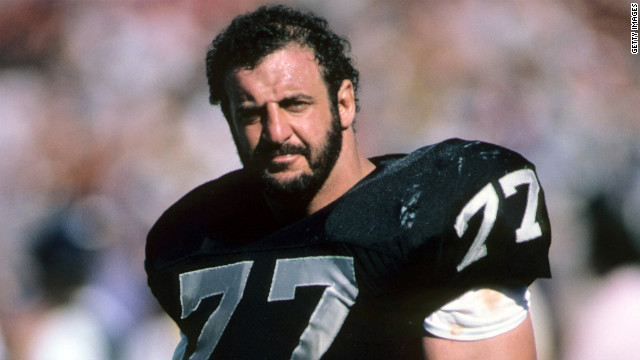 Lyle Alzado was known as one of the most vicious lineman to ever play the game, and he chalked up more than 100 sacks and almost 1,000 tackles. Before his death from brain cancer at age 43, he told Sports Illustrated he began using steroids in 1969 and that, "On some teams between 75 and 90% of all athletes use steroids."
Lyle Alzado was known as one of the most vicious lineman to ever play the game, and he chalked up more than 100 sacks and almost 1,000 tackles. Before his death from brain cancer at age 43, he told Sports Illustrated he began using steroids in 1969 and that, "On some teams between 75 and 90% of all athletes use steroids." 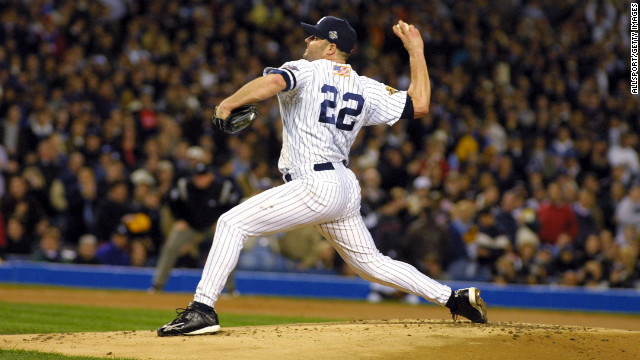 Known as "Rocket" for his aggressive pitching style, Roger Clemens played pro ball for more than two decades, racking up seven Cy Youngs. He left Major League Baseball under a cloud of steroid allegations, despite a court finding him not guilty of perjury when he told Congress he never used the drugs.
Known as "Rocket" for his aggressive pitching style, Roger Clemens played pro ball for more than two decades, racking up seven Cy Youngs. He left Major League Baseball under a cloud of steroid allegations, despite a court finding him not guilty of perjury when he told Congress he never used the drugs.  At 6-foot-5 and 260 pounds, Alistair Overeem is known for putting mixed martial arts star Brock Lesnar into early retirement. Ahead of a heavyweight title match against UFC champion Junior dos Santos in May, Overeem tested positive for elevated levels of testosterone and was yanked from the card.
At 6-foot-5 and 260 pounds, Alistair Overeem is known for putting mixed martial arts star Brock Lesnar into early retirement. Ahead of a heavyweight title match against UFC champion Junior dos Santos in May, Overeem tested positive for elevated levels of testosterone and was yanked from the card.  An early and chief accuser of Armstrong, Floyd Landis was himself stripped of his 2006 Tour de France title after testing positive for performance-enhancing drugs. He admitted doping in 2010, the same year he accused many other riders of doping as well.
An early and chief accuser of Armstrong, Floyd Landis was himself stripped of his 2006 Tour de France title after testing positive for performance-enhancing drugs. He admitted doping in 2010, the same year he accused many other riders of doping as well. 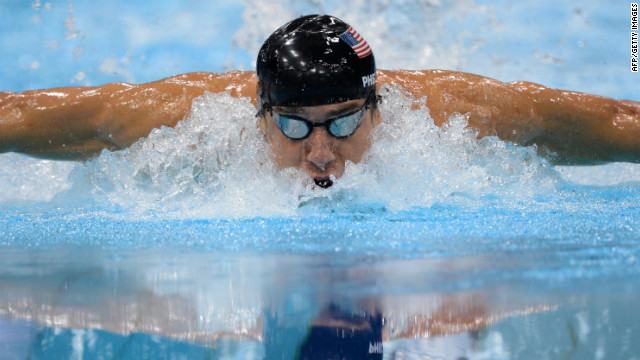 As the most decorated Olympian ever, with 22 medals, Michael Phelps is known as a fish in human's clothing, but for a brief period in 2009, after a photo of him smoking a bong was made public, he also was known as a pothead. Despite losing sponsors, he quickly became known for swimming again, securing six medals in the 2012 Games.
As the most decorated Olympian ever, with 22 medals, Michael Phelps is known as a fish in human's clothing, but for a brief period in 2009, after a photo of him smoking a bong was made public, he also was known as a pothead. Despite losing sponsors, he quickly became known for swimming again, securing six medals in the 2012 Games.  Marion Jones was a world champion track and field athlete who won several titles in the 1990s and five medals during the 2000 Olympic Games in Sydney, Australia. After admitting in 2007 that she had taken performance-enhancing drugs, she was stripped of the gold medals and other honors won after the 2000 Games.
Marion Jones was a world champion track and field athlete who won several titles in the 1990s and five medals during the 2000 Olympic Games in Sydney, Australia. After admitting in 2007 that she had taken performance-enhancing drugs, she was stripped of the gold medals and other honors won after the 2000 Games. 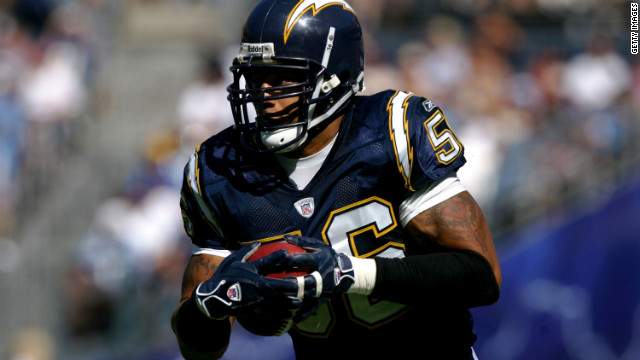 Known as "Lights Out" after knocking out four players in a high school game, Shawne Merriman entered the NFL with fanfare, earning 2005 Rookie of the Year honors. His 2006 suspension for steroid use prompted the "Merriman Rule," prohibiting any player who tests positive for steroids from going to the Pro Bowl that year.
Known as "Lights Out" after knocking out four players in a high school game, Shawne Merriman entered the NFL with fanfare, earning 2005 Rookie of the Year honors. His 2006 suspension for steroid use prompted the "Merriman Rule," prohibiting any player who tests positive for steroids from going to the Pro Bowl that year.  After his former Texas Rangers teammate Jose Canseco accused him of using steroids, Rafael Palmeiro appeared before Congress to deny the allegations. Later that year, he was suspended from baseball for testing positive for steroids. He maintains to this day he has never knowingly taken performance enhancers.
After his former Texas Rangers teammate Jose Canseco accused him of using steroids, Rafael Palmeiro appeared before Congress to deny the allegations. Later that year, he was suspended from baseball for testing positive for steroids. He maintains to this day he has never knowingly taken performance enhancers. 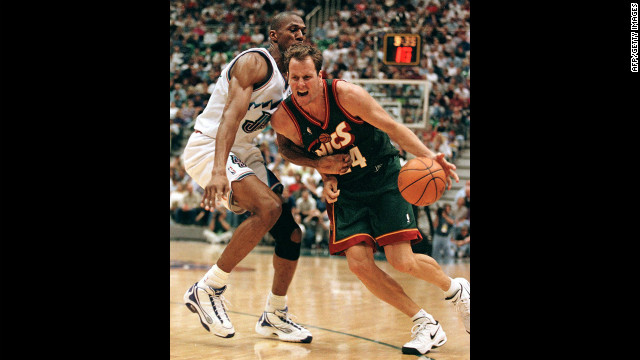 Few NBA players have tested positive for steroids, not only because the sport relies less on raw strength and speed than other sports but also because the league didn't begin testing until 1999. Miami Heat forward Don MacLean became the first to fail a test in 2000, and he was suspended for five games.
Few NBA players have tested positive for steroids, not only because the sport relies less on raw strength and speed than other sports but also because the league didn't begin testing until 1999. Miami Heat forward Don MacLean became the first to fail a test in 2000, and he was suspended for five games. 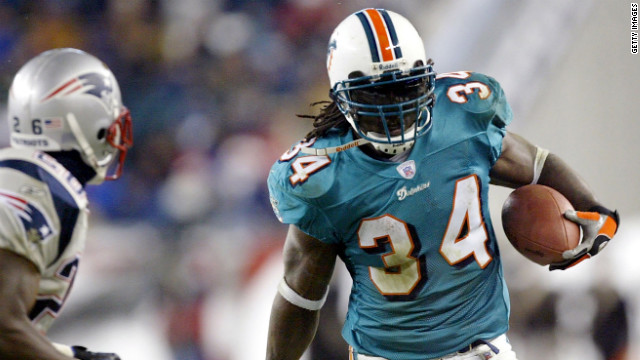 After racking up awards in college football, Ricky Williams was picked in the first round of the pro football draft in 1999. After testing positive for marijuana in 2004 as a Miami Dolphin, Williams retired and studied holistic medicine in California. He returned to the Dolphins the following year, only to have more run-ins with the NFL drug policy. He retired again in 2011.
After racking up awards in college football, Ricky Williams was picked in the first round of the pro football draft in 1999. After testing positive for marijuana in 2004 as a Miami Dolphin, Williams retired and studied holistic medicine in California. He returned to the Dolphins the following year, only to have more run-ins with the NFL drug policy. He retired again in 2011. 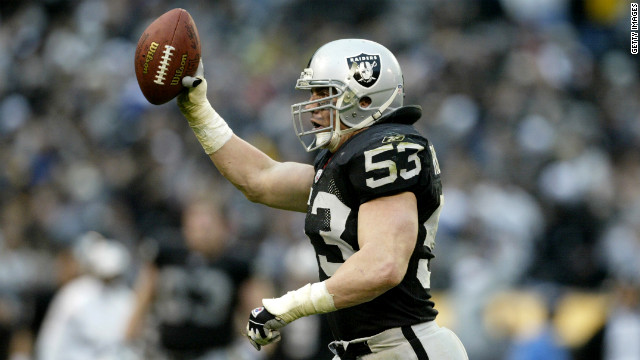 Bill Romanowski was known for hard hits on the gridiron, but he also violently attacked teammate Marcus Williams during a scrimmage while playing for the Oakland Raiders. In a lawsuit, Williams blamed the attack on Romanowski's "roid rage." Romanowski settled the suit and in 2005 admitted to "60 Minutes" that he used steroids.
Bill Romanowski was known for hard hits on the gridiron, but he also violently attacked teammate Marcus Williams during a scrimmage while playing for the Oakland Raiders. In a lawsuit, Williams blamed the attack on Romanowski's "roid rage." Romanowski settled the suit and in 2005 admitted to "60 Minutes" that he used steroids. 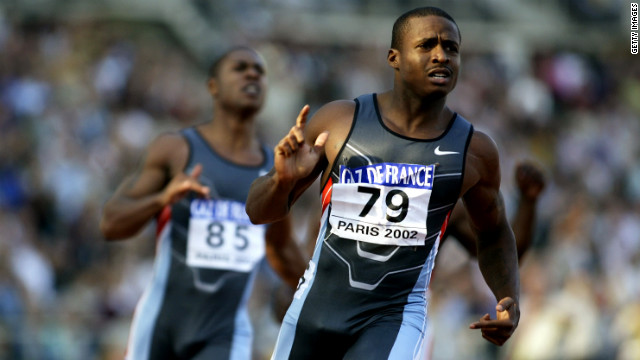 Sprinter Tim Montgomery set the world record in the 100-meter dash in 2002, but the time was scratched after he was found to have used performance-enhancing drugs. Since his retirement, he has had other legal troubles including arrests for money laundering and heroin offenses. He was sentenced to jail time for both.
Sprinter Tim Montgomery set the world record in the 100-meter dash in 2002, but the time was scratched after he was found to have used performance-enhancing drugs. Since his retirement, he has had other legal troubles including arrests for money laundering and heroin offenses. He was sentenced to jail time for both. 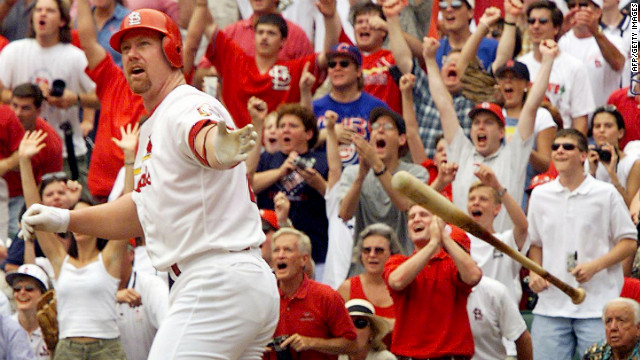 An Olympian and renowned longball hitter, Mark McGwire spent his entire career with the Oakland A's and St. Louis Cardinals, breaking the single-season home run record in 1998. In 2010, he admitted using steroids over the course of a decade but told Bob Costas in an interview he took them only for health reasons.
An Olympian and renowned longball hitter, Mark McGwire spent his entire career with the Oakland A's and St. Louis Cardinals, breaking the single-season home run record in 1998. In 2010, he admitted using steroids over the course of a decade but told Bob Costas in an interview he took them only for health reasons. 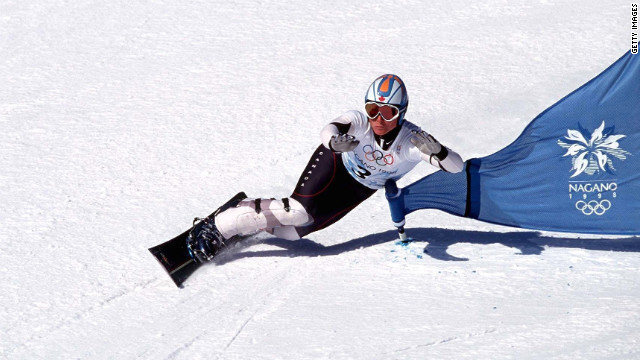 Ross Rebagliati won a gold medal during the first year of snowboarding at the 1988 Olympics. He was stripped of the medal after testing positive for the active ingredient in marijuana. It became fodder for late-night talk show jokes, but Rebagliati eventually got his medal back after it was determined marijuana was not a banned substance.
Ross Rebagliati won a gold medal during the first year of snowboarding at the 1988 Olympics. He was stripped of the medal after testing positive for the active ingredient in marijuana. It became fodder for late-night talk show jokes, but Rebagliati eventually got his medal back after it was determined marijuana was not a banned substance.  A winner of eight Grand Slam events, Andre Agassi was considered one of the most dominant tennis players of the 1990s. In 2009, the tennis pro acknowledged in his autobiography that he had failed a drug test for methamphetamine in 1997 but skirted punishment by blaming an assistant.
A winner of eight Grand Slam events, Andre Agassi was considered one of the most dominant tennis players of the 1990s. In 2009, the tennis pro acknowledged in his autobiography that he had failed a drug test for methamphetamine in 1997 but skirted punishment by blaming an assistant. 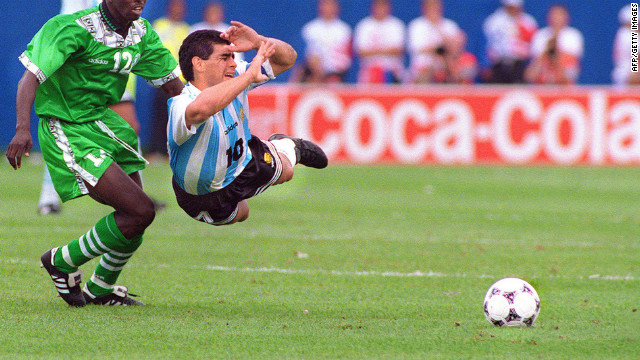 Regarded as the best soccer player after Pele, Diego Maradona was known for his deft footwork and knack for finding the net. In 1991, he was suspended for 15 months after testing positive for cocaine. He would later admit he was addicted to the drug for about 20 years and began using when he was playing for Barcelona in the 1980s.
Regarded as the best soccer player after Pele, Diego Maradona was known for his deft footwork and knack for finding the net. In 1991, he was suspended for 15 months after testing positive for cocaine. He would later admit he was addicted to the drug for about 20 years and began using when he was playing for Barcelona in the 1980s. 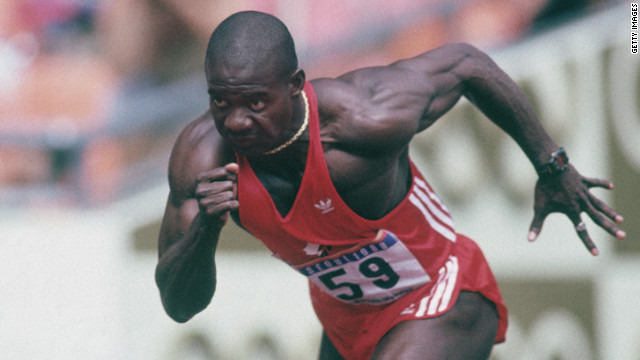 A prolific sprinter in the 1980s, Canadian Ben Johnson routinely bested American Carl Lewis in the 100-meter dash. After winning the gold at Seoul in 1988, Johnson tested positive for a steroid. His coach said Johnson took the drugs to keep up with other athletes and later wrote a book saying all top athletes were using in those days.
A prolific sprinter in the 1980s, Canadian Ben Johnson routinely bested American Carl Lewis in the 100-meter dash. After winning the gold at Seoul in 1988, Johnson tested positive for a steroid. His coach said Johnson took the drugs to keep up with other athletes and later wrote a book saying all top athletes were using in those days. 
1

2

3

4

5

6

7

8

9

10

11

12

13

14

15

16

17

18

19

20
 Photos: Drug scandals in sports
Photos: Drug scandals in sports About Performance-Enhancing Drugs: There are several types of performance-enhancing drugs: anabolic steroids, stimulants, human growth hormone and supplements.
Anabolic steroids are synthetic substances that stimulate proteins that help build non-fat muscle mass, helping an athlete become stronger and able to train and play for longer periods of time.
Tetrahydrogestrinone, also called "THG" or "The Clear," is the type of steroid purportedly used by many high-profile athletes, including track star Marion Jones and baseball player Barry Bonds.
Stimulants help boost an athlete's energy level, helpful after strenuous training. Amphetamines are a type of stimulant.
Human growth hormone (HGH), is available only by prescription and is administered by injection. Athletes take it for improved endurance and strength although there is no definitive proof that it boosts athletic performance.
Androstenedione, known as "andro," was formerly an over the counter supplement but was banned by the NFL, Olympics, NCAA and later the MLB. It helps the body process testosterone.
Timeline: 1976 - The International Olympic Committee (IOC) bans the use of steroids.
July 1981 - U.S. discus thrower Ben Plucknett tests positive for anabolic steroids. He loses his world record title, the first athlete to be disqualified by the International Association of Athletic Federations due to a positive drug test.
1987 - The National Football League begins testing players for steroids.
1988 - Congress passes the Anti-Drug Abuse Act, which makes possession and distribution of nonprescription anabolic steroids for non-medical purposes a crime.
1990 - Congress strengthens the 1988 law by classifying anabolic steroids as a controlled substance.
1999 - The IOC creates the World Anti-Doping Agency.
2000 - The U.S. Anti-Doping Agency (USADA) is established.
2003 - Major League Baseball institutes its first steroid policy, which is criticized for being too lenient.
Spring 2003 - In a secretly taped conversation, personal trainer Greg Anderson acknowledges he had provided baseball player Barry Bonds with an "undetectable" performance-enhancing drug.
June 2003 - Track coach Trevor Graham anonymously contacts the U.S. Anti-Doping Agency and provides them with a syringe filled with THG and says it was supplied by BALCO CEO Victor Conte. Graham is Olympic gold medalist Marion Jones's former coach.
September 3, 2003 - Federal agents raid BALCO offices and seize containers labeled steroids and human growth hormones. During the raid, CEO Victor Conte allegedly says he had provided Barry Bonds with steroids and that the outfielder had used them regularly. Conte has since denied making the statements. Also during the raid, Bonds' personal trainer Greg Anderson admits distributing steroids.
October 23, 2003 - The grand jury investigation into the BALCO lab and steroids in sports begins.
November 6, 2003 - Sprinter Tim Montgomery testifies before the federal grand jury that Victor Conte had claimed he provided Barry Bonds with the steroid Winstrol in 2000 or 2001. Conte later denies the allegation.
February 12, 2004 - Victor Conte, James Valente (BALCO vice-president), Greg Anderson, and Remi Korchemny (track coach), are indicted on 42-counts including conspiracy to distribute steroids, misbranding drugs with intent to defraud, and money laundering.
July 2004 - C. J. Hunter, Marion Jones's ex-husband, says Jones was on steroids when she won five medals in the Sydney Olympics. Jones denies the allegations.
October 11, 2004 - New York Yankees outfielder Gary Sheffield tells Sports Illustrated that Barry Bonds introduced him to Victor Conte and Greg Anderson and claims Anderson gave him a BALCO cream that he said he later learned was a designer steroid.
December 2, 2004 - The "San Francisco Chronicle" releases leaked information from secret grand jury testimony from December 2003, that New York Yankees player Jason Giambi testified that he had injected himself with a human growth hormone in 2003 and used steroids for at least three seasons.
December 3, 2004 - The Chronicle releases more leaked testimony from the December 2003 grand jury testimony. The transcripts reveal that Barry Bonds testified before the grand jury that he unknowingly used steroids provided to him by trainer Greg Anderson.
February 14, 2005 - Retired baseball star Jose Canseco publishes his autobiography, entitled "Juiced: Wild Times, Rampant 'Roids, Smash Hits and How Baseball Got Big." In the book, Canseco recounts his own steroid use and implicates other players.
March 17, 2005 - Six former and current Major League Baseball stars testify before the House Committee on Government Reform about drugs in baseball. They include Mark McGwire, Sammy Sosa, Rafael Palmeiro, and Jose Canseco. Some flatly deny using steroids, while others evade the question.
July 13, 2005 - The National Hockey League settles the longest strike in professional sports history. One of the agreements involves the League's first testing policy for performance-enhancing drugs.
July 15, 2005 - Victor Conte and Greg Anderson plead guilty to steroid distribution and money laundering. James Valente pleads guilty to steroid distribution. Conte serves four months in prison, Anderson serves three, and Valente receives probation.
November 15, 2005 - Major League Baseball announces that it is increasing penalties for doping.
March 23, 2006 - Reporters Mark Fainaru-Wada and Lance Williams of the "San Francisco Chronicle" release the exposé "Game of Shadows: Barry Bonds, BALCO, and the Steroids Scandal that Rocked Professional Sports."
March 30, 2006 - Major League Baseball Commissioner Bud Selig announces an investigation of steroid use among pro baseball players. Former U.S. Sen. George Mitchell will lead the investigation.
May 31, 2006 - Cyclist Lance Armstrong, seven-time winner of the Tour de France, is cleared of doping allegations connected to the 1999 Tour de France by the International Cycling Union.
August 22, 2006 - The U.S. Anti-Doping Agency bans sprinter Justin Gatlin for eight years after he tests positive for banned substances a second time. Gatlin is also forced to forfeit his 100-meter world record.
November 2, 2006 - Track coach Trevor Graham, former trainer of Marion Jones, Justin Gatlin and others, is indicted by a federal grand jury for lying to investigators during the BALCO investigation.
May 25, 2007 - 1996 Tour de France winner Bjarne Riis admits using performance-enhancing drugs to win his title. He is the first Tour de France winner to admit to doping.
September 20, 2007 - A U.S. arbitration panel strips cyclist Floyd Landis of his 2006 Tour de France title, and bans him for two years after a positive test for synthetic testosterone after the race. He is the first winner in the race's 105 year history to lose his title due to doping.
October 5, 2007 - Former Olympic gold medalist Marion Jones pleads guilty to lying to a federal investigator about taking banned substances.
October 15, 2007 - Floyd Landis appeals the loss of his Tour de France title to the Court of Arbitration for Sport in Switzerland. The panel later upholds the doping charges against Landis.
November 15, 2007 - A federal grand jury indicts baseball player Barry Bonds on perjury and obstruction of justice charges. The indictment is in connection to an investigation of the use of steroids in major league baseball.
December 7, 2007 - Barry Bonds pleads not guilty to charges of perjury and obstruction of justice and is released on $500,000 bond.
December 12, 2007 - The IOC strips former gold medalist Marion Jones of the five medals she won at the 2000 Olympics in Sydney, Australia.
December 13, 2007 - The Mitchell Report is released, linking several current and former Major League Baseball players such as Barry Bonds, Roger Clemens, Andy Pettitte, Eric Gagne, Gary Sheffield, and Paul Lo Duca to alleged use of performance-enhancing substances.
January 11, 2008 - Marion Jones is sentenced to six months in prison after pleading guilty in October 2007 to lying to investigators about her steroid use.
January 15, 2008 - The House Oversight and Government Reform Committee holds hearings in response to the Mitchell Report on doping in Major League Baseball.
February 8, 2008 - Former NY Mets clubhouse employee Kirk Radomski is sentenced to five years probation and an $18,000 fine. He pled guilty in 2007 to distributing steroids and laundering money between 1995 and 2005. In exchange for probation, Radomski agrees to cooperate with government investigations into steroid use in sports.
February 13, 2008 - In a hearing before the House Oversight and Government Reform Committee, Roger Clemens denies ever taking performance-enhancing drugs.
February 27, 2008 - Representatives Henry A. Waxman and Tom Davis ask the Justice Department to investigate possible perjury in the testimony of Roger Clemens.
March 7, 2008 - Former sprinter Marion Jones reports to the Federal Medical Center Carswell in Fort Worth, Texas to begin serving a six-month sentence for lying to federal prosecutors about her steroid use.
February 9, 2009 - New York Yankees baseball player Alex Rodriguez admits to using performance-enhancing drugs from 2001 to 2003 while playing for the Texas Rangers.
February 10, 2009 - Houston Astros shortstop Miguel Tejada is charged with making false statements to Congress. He is accused of lying during his 2005 testimony to investigators looking into steroids in Major League Baseball.
February 11, 2009 - Miguel Tejada pleads guilty to the misdemeanor charge of lying to Congress. In March 2009 he is sentenced to one year of unsupervised probation.
May 7, 2009 - The Office of the Commissioner of Baseball announces that outfielder Manny Ramirez of the Los Angeles Dodgers is suspended for 50 games for a violation of Major League Baseball's Joint Drug Prevention and Treatment Program. The suspension of Ramirez is effective immediately.
January 11, 2010 - Mark McGwire, who broke Roger Maris' single season home run record in 1998, admits to using steroids during his career.
August 19, 2010 - Former pitcher Roger Clemens is indicted on charges of lying to Congress in 2008 when he said he never used performance-enhancing drugs.
April 2011 - The Swiss-based Court of Arbitration for Sport appoints a panel to try 2010 Tour de France winner Alberto Contador's doping case. If Contador is found guilty, he could lose his title and be banned for two years.
April 13, 2011 - Bonds is convicted of one count of obstruction of justice. A mistrial is declared on three counts of perjury after jurors report they can't reach an agreement.
July 6, 2011 - Jury selection begins in the Clemens' trial. A mistrial is declared on July 14.
October 6, 2011 - The Court of Arbitration for Sport rules that athletes suspended for doping cannot be barred from competing in the next Olympics if they have served their ban.
November 22, 2011 - Major League Baseball and the MLB Players Association agree to a new five-year contract that includes among others the following stipulations: starting with 2012 Spring Training, all players will be subject to HGH blood testing for reasonable cause at all times during the year.
December 11, 2011 - Ryan Braun, Milwaukee Brewers left fielder and National League's 2011 "Most Valuable Player", tests positive for a performance-enhancing drug, according to an ESPN report. Braun denies any "intentional violation" of MLB rules and is appealing the result through arbitration.
February 6, 2012 - Three-time Tour de France winner Alberto Contador is stripped of his 2010 Tour de France title and retroactively banned from cycling for two years by the Court of Arbitration for Sport.
February 23, 2012 - A baseball arbitration board throws out the 50-game suspension handed down to Milwaukee Brewers outfielder Ryan Braun. This is the first successful appeal of a suspension under Major League Baseball's anti-drug policy.
June 14, 2012 - The U.S. Anti-Doping Agency confirms that it is opening proceedings against Lance Armstrong and five former teammates. While Armstrong denies the charges, he has been suspended by the World Triathlon Corporation.
June 18, 2012 - Former baseball pitcher Roger Clemens is found not guilty of lying to Congress during an investigation of steroid use among major league players.
August 17, 2012 - The IOC disqualifies American cyclist Tyler Hamilton from the events he competed in at the 2004 Athens Olympic Games and strips him of his gold medal in the Men's Individual Time Trial. Hamilton was disqualified after he admitted to having used performance-enhancing drugs in advance of the Games in a letter sent to the IOC.
August 24, 2012 - USADA strips Lance Armstrong of all Tour de France titles and bans him for life from competition.
October 10, 2012 - The US Anti-Doping Agency (USADA) 202 page report on Armstrong is released. The report places Armstrong at the center at the center of a sophisticated doping program during the years he dominated cycling. Armstrong has always denied the allegations.
October 19, 2012 - A former Pittsburgh Steelers team doctor, Richard Rydze, is arrested and accused of conspiracy to distribute anabolic steroids, human growth hormone and painkillers to patients.
January 10, 2013 - MLB and the MLB Players Association announce their joint drug prevention program will begin testing for human growth hormone during the 2013 regular season.
January 17, 2013 - The IOC strips cyclist Lance Armstrong of the bronze medal he won at the 2000 Olympic Games in Sydney, Australia.
January 17, 2013 - In an interview with Oprah Winfrey, Lance Armstrong admits to using banned performance-enhancing drugs during his cycling career.
March 22, 2013 - MLB files a lawsuit against Florida anti-aging clinic Biogenesis of America and several of its employees, accusing them of providing banned performance-enhancing drugs to baseball players.
June 5, 2013 - According to an ESPN report, Biogenesis of America clinic founder Anthony Bosch, who allegedly supplied baseball players with performance-enhancing substances, will cooperate in the MLB investigation. MLB is set to suspend some 20 players in the coming weeks, including New York Yankee third baseman Alex Rodriguez and Ryan Braun of the Milwaukee Brewers.
July 14, 2013 - Tyson Gay, a former world champion sprinter from the United States, announces he was told by the USADA that an "A" sample from an out of competition test taken in May came back positive, and that he has pulled out of the August world championships in Russia. Also, Jamaican sprinter and former world-record holder Asafa Powell says he was caught for using the banned stimulant oxilofrine that showed up in a test at June's Jamaican trials.
July 22, 2013 - Major League Baseball player Ryan Braun has been suspended without pay for the rest of the 2013 season for violating the league's drug policy, Commissioner Bud Selig announces.
August 5, 2013 - Major League Baseball suspends New York Yankee Alex Rodriguez for 211 regular-season games through the 2014 season. Rodriguez says he plans to appeal. Twelve other players have accepted 50-game suspensions without pay for their ties to the Biogenesis scandal.
August 17, 2013 - Major League Baseball suspends Kansas City Royals Miguel Tejada for 105 games without pay for testing positive for an amphetamine.







